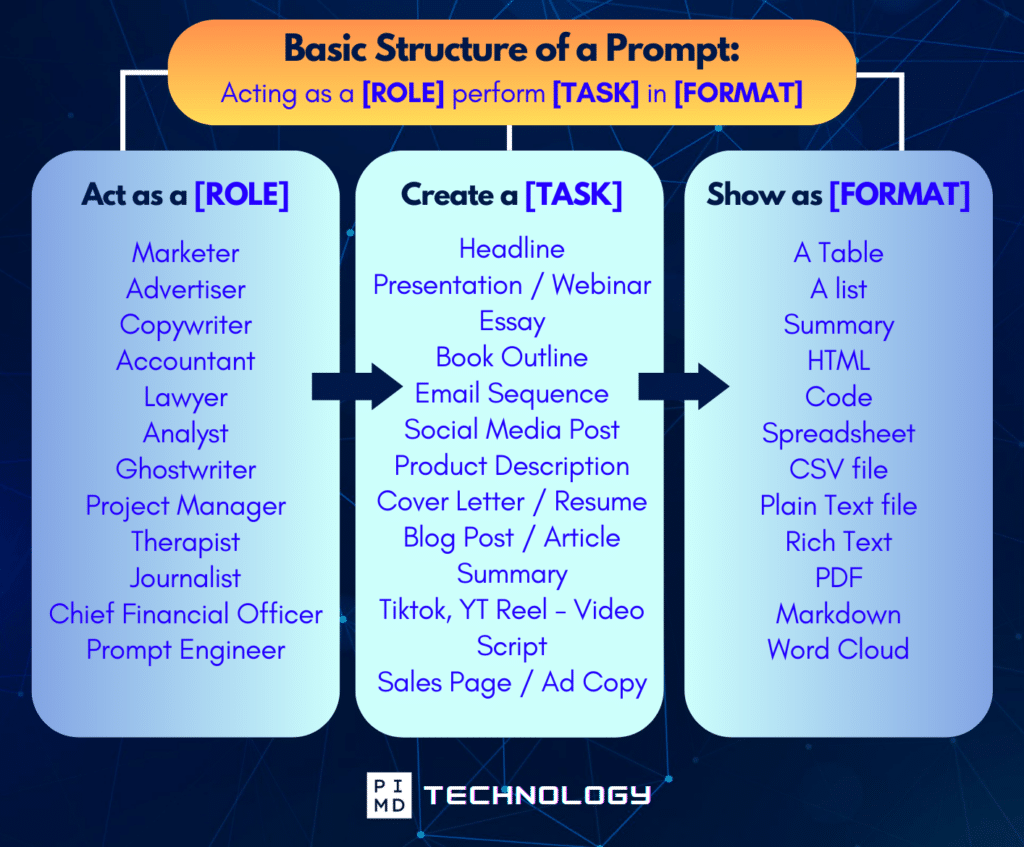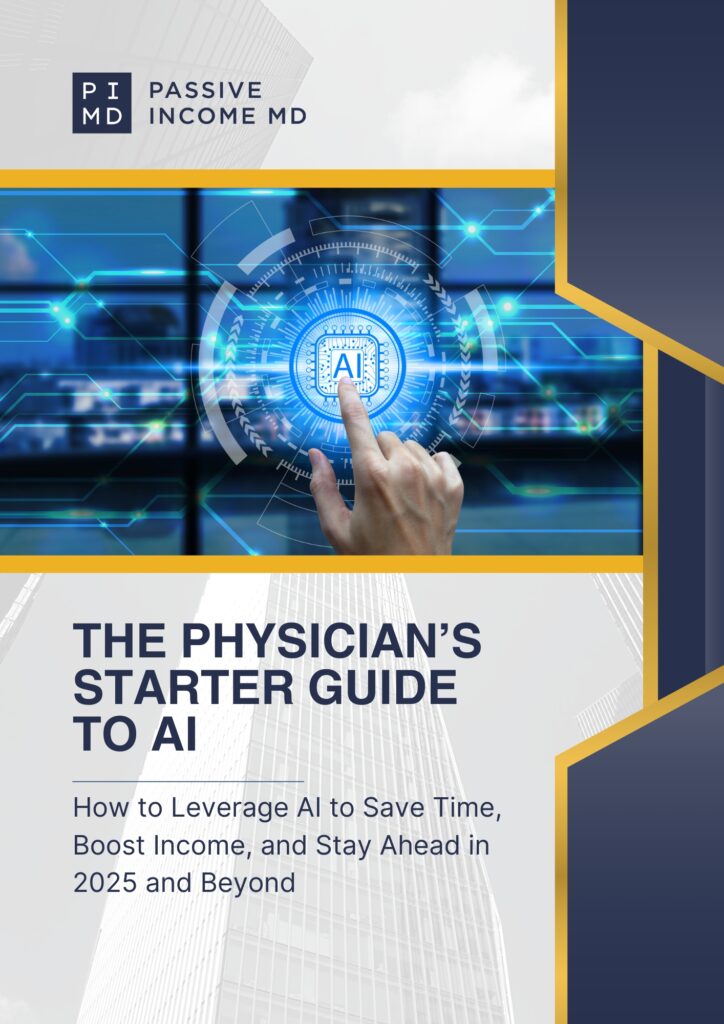AI’s all over the place right now. Your inbox. Your newsfeed. Probably even your family group chat (“Are they still using Google?”). But for many physicians, it’s still a gray area—super cool tech, but how do I actually use it in real life?
So I asked ChatGPT to weigh in.
And in classic ChatGPT fashion, it didn’t hold back. It gave me five solid ways it thinks physicians should be using AI—not just in medicine, but in life, side hustles, and beyond.
Here’s the list, with some context, real-world examples, and a handy memory tool at the end. Let’s get to it!
Note: While these are general suggestions, it’s important to conduct thorough research and due diligence when selecting AI tools. We do not endorse or promote any specific AI tools mentioned here.
1. Be Specific or Be Disappointed
ChatGPT’s take? “The more details you give me, the more helpful I can be.”
Think of it like giving a consult. If you send a vague question like “Patient with abdominal pain—please evaluate,” you’re gonna get a shoulder shrug and some Tylenol. But if you say, “42-year-old female with RUQ pain, hx of gallstones, afebrile, normal labs—what’s your differential?” now you’re cooking.
Same goes with AI. Instead of asking:
“What are some good side hustles?”
Try:
“What are 3 side hustle ideas for a full-time physician with limited time, a background in radiology, and an interest in tech?”
Specifics = useful answers. Vague = generic fluff.
Here’s a simple reference from our downloadable ChatGPT Cheatsheet.

WANT TO GET THE COMPLETE CHATGPT CHEAT SHEET SO YOU CAN JUST COPY AND PASTE?
CLICK HERE TO SUBSCRIBE TO OUR NEWSLETTER AND WE WILL SEND IT “PROMPTLY” TO YOUR EMAIL.
2. Ask It to Think Like You
One of the coolest things about ChatGPT? You can literally tell it who to be.
ChatGPT says:
“When users assign me a persona or role, I can tailor my responses more effectively to meet their expectations.”
In other words, give it context. Want productivity tips?
“Act like a physician coach—what would you recommend to a burnt-out hospitalist trying to cut back from 60 to 40 hours?”
Need business ideas?
“Pretend you’re a physician-turned-entrepreneur with experience in medical devices—what kind of product would you build today?”
It’s like having a super versatile consultant in your pocket. You just have to tell it which hat to wear.
3. Use It for Life Admin (Not Just Medicine)
ChatGPT’s reminder:
“I’m not just trained on medical data—I can assist in countless day-to-day areas where time and decision fatigue wear people down.”
Let’s be honest, medicine is just one part of the equation. You’ve got families, finances, vacations, rental properties, maybe even a podcast or two.
ChatGPT can help plan meals, rewrite your Airbnb listing, or generate travel itineraries with kid-friendly stops (and backup indoor options because, rain).
Some real-life prompts you can use:
- “Plan a weekly low-sodium, high-protein meal plan for a family of four.”
- “Write a friendly but firm message to a tenant who hasn’t paid rent.”
- “Suggest a 5-day Tokyo itinerary for a family with two kids under 10.”
Basically, it’s your unpaid executive assistant (who never asks for PTO).
4. Tell It to Simplify or Translate (Because You’re Human Too)
Here’s a gem straight from the bot:
“My strength is distilling complex information into simpler formats—or vice versa.”
Have you ever tried explaining REIT investing to a friend and watched their eyes glaze over? ChatGPT can break it down in plain English (or literally at a 5th grade reading level).
Need to elevate that same idea for your financial planner?
“Rewrite this message at a professional level with financial terminology.”
Use it like a translator. Whether it’s simplifying a journal article for your patients, or helping you understand a tax form, it’s like having your own personal decoder ring.
5. Always Double-Check the Facts
Even ChatGPT admits:
“While I strive for accuracy, I occasionally generate responses that may be incorrect, outdated, or misleading. Human verification is essential.”
So yeah, it sounds smart. Too smart sometimes. But that doesn’t mean it’s right.
Especially when it comes to anything clinical, financial, or legal—double-check everything. Think of it like your med student who talks a big game during rounds. Helpful? Yes. Confident? Definitely. But still needs a good fact-check.
If you’re using it to brainstorm investment strategies or email patients (HIPAA alert!), sanity check everything. It’s a co-pilot, not an autopilot.

Subscribe to receive the 7 Steps you can follow to achieve Financial Freedom
If financial freedom is your goal, there’s no better time to get started than right now.
Unlock actionable steps that you can take every day to fine-tune your goals, discover your interests, and avoid costly mistakes on your financial freedom journey.

Download The Physician’s Starter Guide to AI!
Conclusion
ChatGPT isn’t just another shiny tech trend—it’s a real tool that can help you save time, stress less, and even make smarter decisions… if you know how to use it right.
But let’s be real: with all the noise out there, it’s easy to get overwhelmed or underuse tools like this. That’s why I like to keep things simple. So if you’re wondering how to actually remember these 5 strategies, just think:
S.M.A.R.T. (Yeah, classic acronym, but it works—and so do these steps)
- S – Specific prompts give better results
- M – Make ChatGPT take on roles (coach, planner, writer, etc.)
- A – Apply it beyond medicine—side hustles, family life, you name it
- R – Rephrase or simplify complex info for yourself or others
- T – Trust but verify—don’t skip the fact-check
If you follow that S.M.A.R.T. framework, you’re already ahead of 90% of people who are still just asking it to write poems about their pets (hey, no judgment).
One personal tip?
Start a ChatGPT “playbook” doc or note on your phone—every time you use it for something that actually helps, write it down. Over time, you’ll build your own custom AI assistant toolkit. Trust me, future you will thank you. And to make it even easier for you, we’ve put together something special:
Download The Physician’s Starter Guide to AI – a free, easy-to-digest resource that walks you through smart ways to integrate tools like ChatGPT into your professional and personal life. Whether you’re AI-curious or already experimenting, this guide will save you time, stress, and maybe even a little sanity.
Want more tips to sharpen your ChatGPT skills? Subscribe to our newsletter for exclusive insights and practical advice. You’ll also get access to our free AI resource page, packed with AI tools and tutorials to help you have more in life outside of medicine. Let’s make life easier, one prompt at a time. Make it happen!
Disclaimer: The information provided here is based on available public data and may not be entirely accurate or up-to-date. It’s recommended to contact the respective companies/individuals for detailed information on features, pricing, and availability.
IF YOU WANT MORE CONTENT LIKE THIS, MAKE SURE YOU SUBSCRIBE TO OUR NEWSLETTER TO GET UPDATES ON THE LATEST TRENDS FOR AI, TECH, AND SO MUCH MORE.
Peter Kim, MD is the founder of Passive Income MD, the creator of Passive Real Estate Academy, and offers weekly education through his Monday podcast, the Passive Income MD Podcast. Join our community at the Passive Income Doc Facebook Group.






